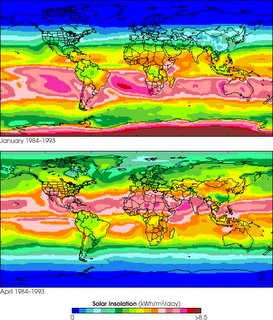
Hey solarDwellers:
When we're talking about solar, we're not talking about our "peak-oil" problem, we're talking about our natural gas/coal/nuclear problem. That black-gold stuff gets all the headlines, but we should be paying more attention to what's on the other side of that plug on your living-room wall.
If one mainly pays attention to the major media, on would think the fate of oil is the be-all and end-all of our energy problems. But hold on there! We have to look at TOTAL energy use worldwide, not just energy used for transportation. I was shaken of this oil-centric way of thinking when I found out the following facts reading in some energy book a while ago, the title of which I can't even remember, but, never fear, the information is also available at the worldenergy.org website:
Transportation(oil):
roughly 30% of world's energy use and emissions problems
Commercial/Industrial electricity/heating(coal,nuclear,nat gas)roughly 50% of world's energy use and emissions problems
Residential electricity/heating (coal,nuclear,nat gas)
roughly 20% of world's energy use and emissions problems
In other words, 70% of our energy use is NON-TRANSPORTATION related, meaning it's related mainly to the production of heat and electricity for the world's homes and buildings. And this energy comes mainly from coal, natural gas, nuclear and renewable sources. When I first came across this statistic--that oil represents 30% of total world energy use--I was quite surprised! Shocked! I thought oil was AT LEAST 50% if not more of energy demand. Must've been paying too much attention to the sexy oil crisis in the papers. In turn, my attention then went more toward our "electricity/heating" problems in need of solutions. So, wouldn't you say we need a few more column-inches in our newspapers reserved for reporting on reducing electricity use, increasing efficiency, and the ramping up the use of renewable sources of energy to produce our electricity. (Don't get me wrong, oil is a BIG problem, being the main input for our transportation and petroleum-based agriculture, paint and agricultural sectors. But, hey, that's for another post; we're talking electricity for now).
So, solar and renewable sources for electricity are indeed BIG parts of the total energy equation, and it's not all oil, I have come to realize.
And on the sixth day, a solarDweller was born. No time to rest on the seventh, though. Too many people to tell about solar!
--the solarDweller
Categories: solar, solar+power, peak+oil, nuclear, electricity, whatsnews
1 comment:
Kodijak: I must admit that since I'm an apartment-dweller, conservation is easier being in a smaller living space. Congrats on your energy conservation: two steps ahead of me! I just moved, but before moving I only used about 100 kWh of electricity/month (no dishwasher, fluorescent lighting, gas oven/stove, washer/dryer on the landlord's bill).
Now we unfortunately have electric baseboard heaters in our current residence and electric range. So we're up to about 350 kWh in the winter, but hopefully a lot less in the Spring/summer. The flip-side is that now we use no gas. Which is better? I guess it comes down to which is cleaner and more efficient, which depends on the generating source of the electricity when comparing to natural gas. In California, for example, electricity is pretty "clean" when compared to the Midwest, where electricity is more likely to be coal or nuclear based.
Again, I would like to see "electricity" labeling, a meter inside the house that shows kWh consumed/day or month, and greenhouse gases/pollution emitted per kWh, depending on your state of residence.
Might a solar-electric system make sense for you? Or solar hot water, which is VERY economical If you would like, you could send me an e-mail or post a comment with roughly how many kWh of electricity you used over the previous twelve months and what state your in and I'll gladly do some estimates for you, unless you've already done that!
Post a Comment